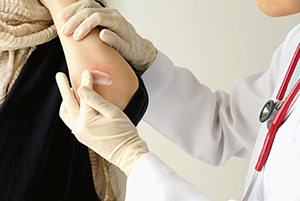Eczema Specialist in Crystal Springs, FL

Natural Eczema Treatment
Eczema is a term used to describe skin conditions characterized by chronic itchiness and inflamed (swollen) skin. There is no known cure for eczema, but symptoms are manageable with proper treatment. Treatment for eczema helps reduce symptoms by addressing the hyper-reactive immune system that causes eczema and other allergic responses.
Both traditional and natural treatments for eczema have been found to be effective, and many natural treatments can be done easily at home.
To schedule a consultation with a Crystal Springs eczema specialist, call (813) 536-3212 or contact Dr. Christopher Van Benschoten online.
What Is Eczema?
Eczema is a group of skin conditions characterized by the skin becoming inflamed or irritated. Eczema is often caused by immune reactions that cause skin inflammation and other symptoms; why this happens is not known, but heredity is thought to be a factor. The most common and severe type of eczema is called atopic dermatitis, which can cause scaly skin, open sores, and cracks behind the ears. Other types of eczema include:
- Contact dermatitis, which is caused by contact with skin-irritating substances
- Dyshidrotic eczema, which causes small, itchy blisters on the extremities
- Hand eczema, which is limited to the hands
- Lichen simplex chronicus/neurodermatitis, which causes large, thick, scaly patches
- Nummular eczema, which causes coin-shaped lesions
- Seborrheic dermatitis, which usually occurs on the scalp and causes dandruff and yellow, greasy skin
- Stasis dermatitis, which usually occurs due to circulation problems and involves swelling of ankles
Symptoms of Eczema
No matter the type or severity, eczema will almost always cause chronic itchiness that may worsen at night. In fact, eczema symptoms can be worsened by scratching, and some symptoms are actually caused by scratching.
Other signs and symptoms of eczema include:
- Red or brownish-gray patches, most commonly on the face, hands, wrists, feet, or backs of the knees
- Dry, cracked, crusty, or scaly skin
- Small, raised bumps that may leak fluid and crust
- Pigmentation changes due to changes
- Chronic skin inflammation from scratching
While many children with eczema grow out of it, adults with eczema may find that their condition is chronic (long-lasting).
If not treated, eczema may even lead to skin infections, at which point the patient should contact a healthcare provider. Patients with eczema should also seek medical attention in the event that home remedies are ineffective or the symptoms are affecting sleep or daily activities.
Treatment for Eczema
Treatment for eczema is aimed at preventing outbreaks and relieving symptoms during outbreaks. Practitioners of all types of medicine agree that a skin care regimen is important for eczema management. Skin care techniques to treat and prevent eczema symptoms that may be recommended by either a traditional or alternative healthcare professional include:
- Moisturizing your skin frequently, especially when it's damp
- Avoiding sudden changes in temperature or humidity
- Avoiding sweating or overheating if possible
- Reducing or ceasing use of harsh soaps and detergents
- Avoid wearing scratchy materials like wool
- Identifying and avoiding foods that may cause outbreaks, possibly with the help of an allergist
- Reducing stress
While they do not prevent or treat rashes, cold compresses may also be used to relieve itching.
Conventional Treatment for Eczema
Conventional eczema treatment is aimed mostly at preventing itching since infection can occur from scratching rashes. Itching can be lessened by:
- Topical creams containing corticosteroids
- Antihistamines
- Ultraviolet light therapy
- Cyclosporine, a drug that reduces immune system activity
- Topical immunomodulators (TIMs), which reduce immune system activity
- Biologics, which are antibodies that control inflammation
In the event of skin infections, antibiotics may be prescribed.
Natural Treatment for Eczema
Several topical and edible natural treatments have been found to benefit eczema patients by reducing itching, moisturizing skin to prevent outbreaks, or lessening the chance of infection. Topical natural eczema treatments include:
- Coconut oil or diluted apple cider vinegar, which reduce staph bacteria on the skin
- Sunflower oil, an anti-inflammatory agent which helps moisturize the skin
- Cardiospermum ointment, which is anti-inflammatory and antibacterial
- Topical vitamin B12, which reduces itching and rashes
- Vegetable shortening, which moisturizes skin
- Baths with a few handfuls of oatmeal, a few cups of baking soda, a cup of vegetable oil, or a teaspoon of lavender essential oil in the bathwater; these reduce itching
- Olive oil, which can reduce inflammation
- Diluted tea tree oil, which can reduce itching and soften scaly eczema rashes
- Aloe vera, which is anti-inflammatory and helps the healing
Edible natural treatments for eczema include:
- Turmeric, which contains the antioxidant curcumin; curcumin supplements are also available
- Probiotics, which may help reduce inflammation
- Fish oil and flax seeds, which contain anti-inflammatory fatty acids
Some eczema patients have also found that acupuncture helps relieve itching or the urge to scratch.
Request Your Appointment Today
While there is no known cure for eczema, symptoms can easily be managed with natural treatments.
To meet with a Crystal Springs eczema specialist who can assist you in managing eczema symptoms, call (813) 536-3212 or contact Dr. Christopher Van Benschoten online.
Evolution
Address
4691 Van Dyke RoadLutz, FL 33558
(813) 536-3212
www.evolution4health.com
Hours
Mon:
10:00 am - 4:00 pm
Tue:
10:00 am - 4:00 pm
Wed:
10:00 am - 5:00 pm
Thu:
10:00 am - 6:00 pm
Fri:
10:00 am - 3:00 pm
Sat:
Closed
Sun:
Closed


